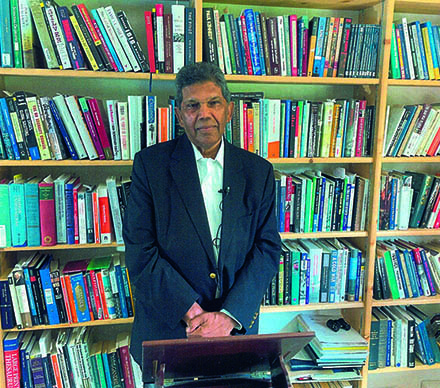By Dr Bertrand Ramcharan
Seventh Chancellor of the University of Guyana.
The author has honours degrees in philosophy, in history, and in law from the University of London.
I write these essays out of a desire to contribute to a discussion of public policy issues in the Dear Land of Guyana. A multi ethnic country like Guyana could benefit from an endowed Institute of Public Policy. Singapore has such an Institute. Guyana has recently established a National Defence Institute. This is a commendable initiative. It could be followed up by the establishment, by Parliament, of a Guyana Institute of Public Policy.
A Constitutional Reform Commission (CRC) has been established and one has recently seen exchanges in the media as to what it might be doing – if at all, on the eve of national elections. One suggestion is that the CRC should “invest heavily in public education and awareness”. There is merit to this idea.
If the Commission cannot, on the eve of national elections, engage in the nuts and bolts of constitutional reform, it could invite, and engage in a national dialogue on the philosophy of governance. There are strands of such a philosophy already in the existing Constitution. But there is need for an overarching consensus on the philosophy of governance in Guyana, given the intense competition for power at election-time and its ethnic overlay.
The CRC could open up a discussion on the philosophy of governance in Guyana, invite written submissions, and hold public hearings on the matter. That would promote public education and awareness. Such a dialogue on the philosophy of governance would require participants to elevate their thinking and could promote consensus and understanding in the wider society.
Participants in such a dialogue process would naturally choose their preferred philosophical frame of reference. One such frame that might be of use to the Commission would be that of the renowned philosopher, John Rawls, considered the philosopher of fairness. Rawls, in the words of Cambridge Professor of Political Philosophy David Runciman, in his 2024 book on the History of Ideas, “wants to know how we can lead our best lives and how in so doing we can be fair to each other.” The quest for fairness is high in the priorities of political commentators in Guyana.
Rawls’ philosophy advocates three principles of governance. The first and most important is the liberty principle, namely that people want to be sure of their personal freedom and to have as much as possible of basic liberties as is compatible with equal liberty for all.
The second principle is the fairness principle: to guarantee that in a free and fair society the opportunities that are available to individuals are equally available to all, in the sense that no one can be ruled out simply because of who they happen to be. This equal opportunity principle aims to stop people from being discriminated against.
The third principle is the caring principle, which advocates that the way a society is organized should work to everyone’s advantage as far as possible. So far as possible, everyone should be treated as ends and not as means. No one should be sacrificed for someone else’s happiness.
Rawls thinks that for a society to be fair, in addition to having basic liberties and equality of opportunity, it also needs to be organized in a caring manner so that its rules work to the benefit of the least advantaged. The priority should be to make sure that the worst-off in a society – the poor, the disadvantaged, the unfortunate – are as well-off as they can be. This principle prioritises improving the condition of the worst-off in so far as that is consistent with equal liberties and equality of opportunity. This is an argument for a redistributive state that organises its rules and principles, its background conditions, so as to pay attention to the people at the bottom of society.
Let us think about how it might benefit Guyana for the CRC to foster a national discussion on these three foundational principles, the liberty principle, the fairness principle, and the caring principle.
The liberty principle: it would be good for Guyanese to tell the CRC what they are feeling as regards the liberty principle, and to enumerate areas where government – whichever party is in power – can act to enhance the enjoyment of liberty in Guyana.
The fairness principle: Likewise, it would be good for Guyanese to tell the CRC about areas where fairness can be enhanced in Guyana. Public hearings that listen directly to the Guyanese electorate could take the discussion above the fray of partisan politics and make a meaningful contribution to the political discourse in Guyana.
The caring principle: Would it not help the quality of governance in Guyana to hear directly from people about where they are hurting and need help and assistance?
Might it elevate the quality of discourse in the Dear Land to hear directly from the people about how governance can be ameliorated through respect for these three great principles of governance: the liberty principle, the fairness principle, and the caring principle?
After inviting written submissions, conducting public hearings, and deliberating within the Commission on these issues, the CRC could issue a report and continue a rolling process of discussion within the society on the philosophy of governance. This would, indeed, be an enriching way to “invest heavily in public education and awareness” on the philosophy of governance in Guyana. It could also be a way of removing the ‘partisan political sting’ out discussion on constitutional reform in Guyana.






